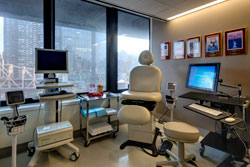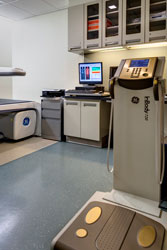Our Approach
Our team at the ICMHC advocates whole body, multifaceted care that incorporates prevention, screening, and treatment services. We treat people, not symptoms.
Although we welcome both men and women to the ICMHC, our special focus is on common ailments affecting men. By housing the expertise of multiple specialties – cardiology, endocrinology, internal medicine, and urology – with the most advanced digital endoscopic, ultrasound, and imaging equipment, our doctors are able to diagnose and manage many conditions with the convenience of one location.
Urological Care

The Iris Cantor Men's Health Center houses the Institute of Bladder and Prostate Health and the Brady Prostate Center in the Department of Urology at Weill Cornell Medical College. With dedicated diagnostic equipment and treatment rooms, our doctors treat a wide range of urologic disorders for both men and women.
Clinical Expertise
- Benign prostatic hyperplasia (BPH)
- Female urology
- Green light laser procedure
- Impotence
- Interstitial cystitis
- Laser surgery
- Minimally invasive surgery
- Neurogenic bladder
- Neurourology
- Overactive bladder
- Pelvic floor reconstruction
- Pelvic prolapse
- Prostate cancer
- Prostatitis
- Robotic surgery
- Urinary incontinence
- Urogynocology
- Voiding dysfunction
In-Office Services
Cystoscopy suite: A cystoscopy is a common urological test that allows the doctor to look inside the bladder.
Video urodynamic testing suites: urodynamic testing is a sophisticated procedure to help diagnose problems with voiding (urination) and/or urinary incontinence (involuntary loss of urine).
Pelvic floor therapy rooms, including:
- Biofeedback therapy: a treatment intended to help patients learn to strengthen and relax their pelvic muscles in order to improve bladder function and decrease pelvic pain.
- Electrical stimulation therapy: a method of improving urinary or bowel control by strengthening and toning pelvic floor muscles and decreasing bladder contractility and irritability.
Full-Body composition scanning: The dual-energy X-ray absorptiometry (DEXA) scan is the newest and most accurate test for determining an individual's body composition, body fat, lean muscle and even bone mineral content and density.
Bioelectrical impedance scan: impedance measurements along with a person's height, weight, and body type (i.e., gender, age, fitness level) are used to calculate body fat, fat-free mass, hydration level, and other body composition values.
Internal Medicine, Cardiology, Endocrinology
Clinical Expertise - Internal Medicine, Cardiology
- Annual physical and preventive care exams
- Acute conditions (i.e., rashes, infections, injuries, headaches, and abdominal pain)
- Cholesterol management
- Coronary artery disease
- Hypertension
- Pre-travel vaccinations and counseling
Clinical Expertise - Endocrinology
- Type 1 and type 2 diabetes mellitus
- Gestational diabetes
- Metabolic bone disease (i.e., osteopenia and osteoporosis)
- Thyroid disorders (i.e., hypo- and hyperthyroidism, thyroid nodules, and thyroid cancer)
- Hypogonadal conditions, including men with low testosterone
In-Office Services: Full-Body Composition Scanning

Bioelectrical impedance scan: impedance measurements along with a person's height, weight, and body type (i.e., gender, age, fitness level) are used to calculate body fat, fat-free mass, hydration level, and other body composition values.
Iris Cantor Men's Health Center
Internal Medicine, Cardiology, Endocrinology
Urological Care
UROLOGICAL CARE


